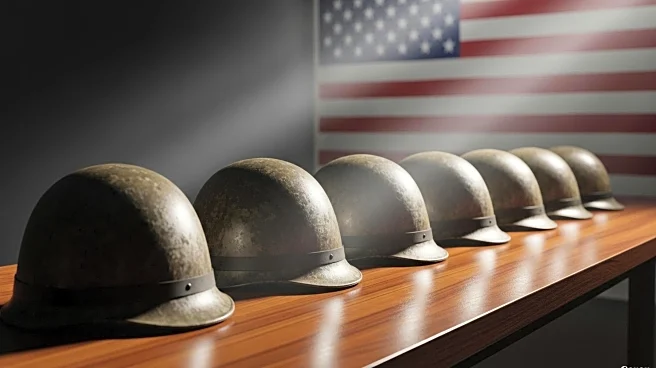What is the story about?
What's Happening?
Defense Secretary Pete Hegseth announced that the 20 soldiers who received Medals of Honor for their actions at Wounded Knee in 1890 will retain their awards. This decision follows a review ordered by former Defense Secretary Lloyd J. Austin III, prompted by a congressional recommendation to rescind the medals due to the massacre of approximately 250 Lakota Sioux tribe members, including women and children. Hegseth stated that the soldiers deserve the medals and their place in history is no longer up for debate. The review panel concluded that the soldiers should keep their medals, although the report may not be made public. President Trump issued an executive order to restore historical narratives, leading to actions that subverted recommendations to remove Confederate references in the military.
Why It's Important?
The decision to retain the Medals of Honor for Wounded Knee soldiers is significant in the context of ongoing debates about historical interpretation and recognition of past injustices. It reflects a broader effort by the current administration to preserve certain historical narratives, despite calls for reevaluation. The move may impact relations with Native American communities and those advocating for historical justice. Additionally, it highlights the tension between preserving military history and addressing controversial aspects of the past. The decision could influence future discussions on how the U.S. military acknowledges and commemorates its history.
What's Next?
The decision may prompt further debate and potential legislative action from lawmakers seeking to address historical injustices. Advocacy groups and Native American communities may continue to push for the revocation of the medals and broader recognition of the events at Wounded Knee. The administration's stance on historical narratives could lead to additional actions regarding Confederate symbols and references within the military, potentially sparking further controversy and discussion.
Beyond the Headlines
The retention of the Medals of Honor raises ethical questions about how the U.S. military and government choose to commemorate historical events, particularly those involving violence against marginalized groups. It underscores the complexities of historical memory and the challenges of reconciling past actions with contemporary values. The decision also reflects broader cultural and political dynamics, as efforts to reinterpret history often intersect with issues of identity, heritage, and national pride.

















